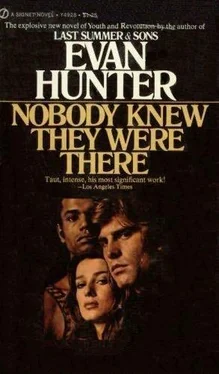Evan Hunter - Nobody Knew They Were There
Здесь есть возможность читать онлайн «Evan Hunter - Nobody Knew They Were There» весь текст электронной книги совершенно бесплатно (целиком полную версию без сокращений). В некоторых случаях можно слушать аудио, скачать через торрент в формате fb2 и присутствует краткое содержание. Город: New York, Год выпуска: 1971, ISBN: 1971, Издательство: Doubleday & Company, Жанр: Проза, на английском языке. Описание произведения, (предисловие) а так же отзывы посетителей доступны на портале библиотеки ЛибКат.
- Название:Nobody Knew They Were There
- Автор:
- Издательство:Doubleday & Company
- Жанр:
- Год:1971
- Город:New York
- ISBN:978-0094575004
- Рейтинг книги:4 / 5. Голосов: 1
-
Избранное:Добавить в избранное
- Отзывы:
-
Ваша оценка:
- 80
- 1
- 2
- 3
- 4
- 5
Nobody Knew They Were There: краткое содержание, описание и аннотация
Предлагаем к чтению аннотацию, описание, краткое содержание или предисловие (зависит от того, что написал сам автор книги «Nobody Knew They Were There»). Если вы не нашли необходимую информацию о книге — напишите в комментариях, мы постараемся отыскать её.
Nobody Knew They Were There — читать онлайн бесплатно полную книгу (весь текст) целиком
Ниже представлен текст книги, разбитый по страницам. Система сохранения места последней прочитанной страницы, позволяет с удобством читать онлайн бесплатно книгу «Nobody Knew They Were There», без необходимости каждый раз заново искать на чём Вы остановились. Поставьте закладку, и сможете в любой момент перейти на страницу, на которой закончили чтение.
Интервал:
Закладка:
Hester’s detractors say she got on broom and flew to Cambridge to provoke them, but no evidence she was anywhere near Massachusetts that tragic week.
I have read these reports over and over again, trying to find in them some reassurance that I will come out of this alive. I have grown accustomed to the investigator’s terse style, in some ways superior to my own when writing a brief or a contract. I have begun to admire his sense of current history, his occasional glints of humor. I have even become fascinated by his obstinate refusal to accept bonds that seem obvious to me. But I find in his abbreviated typewritten biographies neither solace nor salvation.
I try to tell myself that the people with whom I am involved are truly dedicated to a cause which, while it may not be identical to my own, is equally valid. But I cannot muster faith in motives that can be understood only in terms of relationships that appear so intensely personal. Are these three really concerned with violent change, or is this concerted act of murder merely an expression of solidarity from a volatile ménage à trois doggedly maintained over the years? There are too many unanswered questions, and I have become weary tracking down the answers.
Is there any certain evidence that Raines knew Hester in London, or that the Rouen resistance group who led him to Spain and safety (Sud aux Pyrénées, the title sticks in my mind) was indeed the same group to which Epstein had been attached? Is there anything to indicate without doubt that Epstein’s “Mademoiselle” was the Germans’ “Fräulein,” or that he even knew Josette Rivière? Or saw her again in Paris after the war? Or fled to the university here after her death, in an attempt to recapture. what? Something he had known in 1944? In the cellar of a French farmhouse? With this woman and a wounded pilot named Cornelius Raines?
Is there anything at all, any shred of proof to support the theory that Raines- Pratt -Epstein are a figurative reincarnation of Raines- Rivière -Epstein, the trio who worked side by side in those good old days fraught with danger and suspense, south to the goddamn Pyrenees! (Is the bridge over Henderson Gap only a replay of those childhood wartime adventures? Oh, Jesus, is violence as exciting to them as it is to most Americans? But where the hell is the evidence for such a dark surmise?)
What about that trip to Denmark in 1948? One week? Was the nature of that trip really as obvious as it would appear? What else could Epstein have been doing but escorting the damsel in distress, performing another small service for his old comrade in arms, Cornelius Raines, whose indiscretion was about to become apparent? I cannot be sure. I’m a lawyer, I’m concerned with evidence, but there’s only supposition between the lines of these reports, and supposition doesn’t inspire blind faith. I’m the instrument of their deliverance, Raines has told me. But deliverance from what? I don’t know, and maybe I don’t have to know. Maybe, as with the details of wiring a bridge, it’s not necessary for me to understand all of it I know only that I will not read these reports again. I have learned all I hope to learn about the pasts of my co-conspirators. Whatever else there is to know must be gathered from the present.
They are here, the three of them. From somewhere out of the strength of their relationship, one to the other, all to the three, they’ve provided me with an opportunity for revenge. In that respect, they are the collective instrument of my deliverance, and for that I’m grateful.
The rest means nothing.
I do not care.
Weglowski calls the hotel at four p.m. He is a careful man, this Pole. He will discuss nothing on the telephone. He asks me to join him downstairs in the lobby, and when I do, we shake hands briefly and walk to where he has parked his pickup truck. Sitting in the cab, the engine running so that we will have some heat, he tells me he has driven sixty miles through the mountains to the next town where he has purchased the hundred and fifty pounds of dynamite we will need for the bridge. I tell him he has bought enough to blow up the entire state, but he assures me it is only sufficient to do the job properly. He then asks if I can meet him tomorrow night at nine, at which time we will drive out to Henderson Gap to wire the bridge.
“Why tomorrow night?” I ask. “Why must we wire it so far in advance?”
“Better,” he says.
“Why?”
“When you like to do?”
“Friday night.”
“Better tomorrow,” he says.
He has not yet explained why, and so I persist. Isn’t there a greater chance of discovery if we leave all that dynamite just hanging on the bridge for two days in plain sight of anyone who cares to go looking for it? Wouldn’t it be better to wait until Friday night when.
“Who go looking?” Weglowski asks.
“Any number of people might go looking,” I tell him. “I’ve heard that official trains are usually preceded by track walkers…”
“Walkers?”
“Yes, who search the rails for signs of sabotage. If they come looking, as they well might…”
“Can look Friday, too, no?”
“Yes, but that’s only the night before. It seems to me the chances are less likely…
“Cannot do Friday,” he says.
“Why not?”
“Daughter’s birthday Friday. Big party.”
For the next few moments, the conversation takes a ridiculous turn, as though the concept of an assassination having to wait upon a birthday party is too absurdly monumental for me to grasp. I hear myself asking him how old his daughter will be, and he replies she will be twenty, and I say, “Oh, that’s nice, I have a twenty-year-old son,” and he says, “Me, five sons — forty-one, thirty-eight, twenty-six, twenty-two, and seventeen,” and finally I say, “Listen, Weglowski, this bridge is more important than your daughter’s damn birthday party.”
“To who?” he asks.
“To me.”
“Then you do wire job, okay?”
“I don’t know how.”
“Okay. Then we do tomorrow night No difference tomorrow night or Friday night.”
His logic is irrefutable. If the dynamite is to be discovered, it can just as easily be discovered tomorrow or Friday or indeed ten minutes before the train is due. And yet I am vaguely uneasy as I agree to meet him tomorrow at nine. Is it because the actual wiring will bring me closer to the final act itself? Postpone it to Friday, and I will be one step further away from the reality of detonating the charges and watching the train plunge into the ravine below. Wiring the bridge will lend credence to something I have thus far only distantly perceived. The reality of it frightens me. I prefer the fantasy that is Sara. And yet, even that frightens me. They are both real, I know, Sara and the bridge — and both inextricably linked I take her back to the hotel at six o’clock.
I undress her, put her to bed, and then go downstairs for something to eat
There are two federal agents in the lobby.
I do not know who they are, but I know immediately what they are; I have entertained visits from their colleagues often enough, first when I was preparing the defense for the Baltimore draft resisters, and later when I was working on the Hoffstadter brief. They are instantly recognizable, both wearing dark overcoats and gray fedoras, enormous men who stand at the desk in quiet conversation with the girl who relieved Ralph. The redhead blinks up at them from behind her eyeglasses. I move silently past them, through the lobby and into the coffee shop.
Two college-girl waitesses are taking about a new lipstick they saw advertised on television. One of them glances at me, finishes what she was saying, and then walks to where I have taken a stool at the end of the counter.
Читать дальшеИнтервал:
Закладка:
Похожие книги на «Nobody Knew They Were There»
Представляем Вашему вниманию похожие книги на «Nobody Knew They Were There» списком для выбора. Мы отобрали схожую по названию и смыслу литературу в надежде предоставить читателям больше вариантов отыскать новые, интересные, ещё непрочитанные произведения.
Обсуждение, отзывы о книге «Nobody Knew They Were There» и просто собственные мнения читателей. Оставьте ваши комментарии, напишите, что Вы думаете о произведении, его смысле или главных героях. Укажите что конкретно понравилось, а что нет, и почему Вы так считаете.












